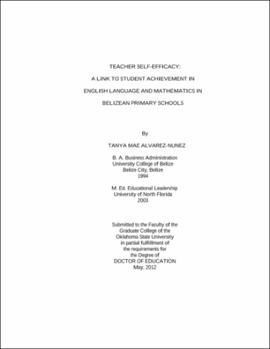| dc.contributor.advisor | Mwavita, Mwarumba | |
| dc.contributor.author | Alvarez-Nunez, Tanya Mae | |
| dc.date.accessioned | 2013-11-26T08:34:47Z | |
| dc.date.available | 2013-11-26T08:34:47Z | |
| dc.date.issued | 2012-05 | |
| dc.identifier.uri | https://hdl.handle.net/11244/7526 | |
| dc.description.abstract | Scope and Method of Study: | |
| dc.description.abstract | This quantitative, non-experimental study sought to determine if a statistically significant difference existed in student achievement on the PSE exam in Belizean primary schools for students who have teachers with varying levels of self-efficacy (high, medium and low). The Teacher Efficacy Scale (TES), which captures the multiple teaching tasks expected as students prepare for the Primary School Exam (PSE): engagement, instruction and management, was used to survey 51 Belizean primary teachers. The design was causal comparative and ANOVA was used to compare the means of the variables and determine the cause for existing differences. | |
| dc.description.abstract | Findings and Conclusions: | |
| dc.description.abstract | Findings revealed that there is a statistically significant difference in student achievement on the PSE exam in Belizean primary schools for students who have teachers with varying levels of self-efficacy. This study implies that all Belizean educators should have high self-efficacy as these are the teachers who generally persevere longer in their efforts to motivate students to achieve academic success despite the numerous obstacles that threaten such as little parental involvement and poverty. | |
| dc.description.abstract | Recommendations: | |
| dc.description.abstract | Policy makers should design and implement strong programs that foster and or maintain a high sense of self-efficacy focusing on engagement, instruction and management. All stakeholders in education should assist in monitoring and supporting educators. Educators must make a conscious effort to regulate their actions as self-efficacy cannot be imitated. | |
| dc.description.abstract | This study shows that there is evidence to support the theory that students with teachers who have a high level of self-efficacy are more likely to achieve academic success. Belizean educators need to appreciate their roles in our schools and recommit themselves to taking the educational level up another notch. | |
| dc.format | application/pdf | |
| dc.language | en_US | |
| dc.rights | Copyright is held by the author who has granted the Oklahoma State University Library the non-exclusive right to share this material in its institutional repository. Contact Digital Library Services at lib-dls@okstate.edu or 405-744-9161 for the permission policy on the use, reproduction or distribution of this material. | |
| dc.title | Teacher self-efficacy: A link to student achievement in English language and mathematics in Belizean primary schools | |
| dc.contributor.committeeMember | Harris, Edward | |
| dc.contributor.committeeMember | Wanger, Steve | |
| dc.contributor.committeeMember | Brown, Pamela | |
| osu.filename | AlvarezNunez_okstate_0664D_11953.pdf | |
| osu.accesstype | Open Access | |
| dc.type.genre | Dissertation | |
| dc.type.material | Text | |
| dc.subject.keywords | belizean primary schools | |
| dc.subject.keywords | student achievement | |
| dc.subject.keywords | teacher efficacy | |
| thesis.degree.discipline | Higher Education | |
| thesis.degree.grantor | Oklahoma State University | |
